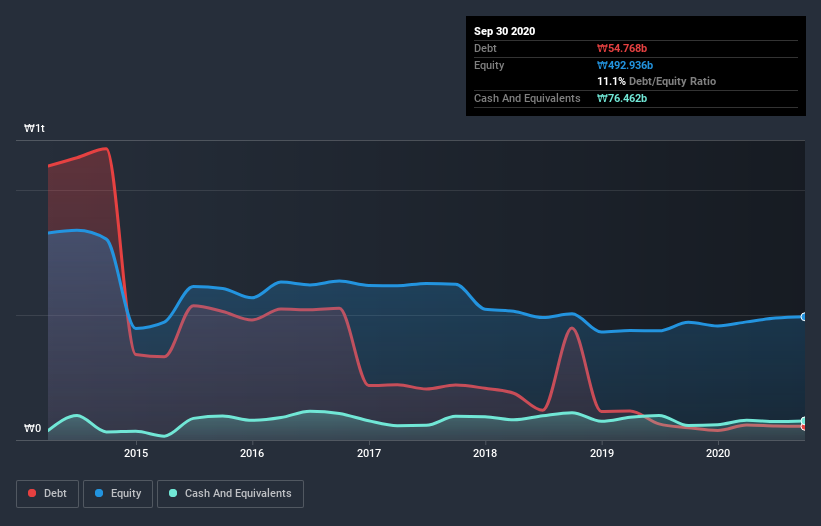- South Korea
- /
- Paper and Forestry Products
- /
- KOSE:A004150
Here's Why Hansol Holdings (KRX:004150) Has A Meaningful Debt Burden
Warren Buffett famously said, 'Volatility is far from synonymous with risk.' So it seems the smart money knows that debt - which is usually involved in bankruptcies - is a very important factor, when you assess how risky a company is. Importantly, Hansol Holdings Co., Ltd. (KRX:004150) does carry debt. But is this debt a concern to shareholders?
Why Does Debt Bring Risk?
Debt and other liabilities become risky for a business when it cannot easily fulfill those obligations, either with free cash flow or by raising capital at an attractive price. Ultimately, if the company can't fulfill its legal obligations to repay debt, shareholders could walk away with nothing. However, a more common (but still painful) scenario is that it has to raise new equity capital at a low price, thus permanently diluting shareholders. Of course, debt can be an important tool in businesses, particularly capital heavy businesses. The first thing to do when considering how much debt a business uses is to look at its cash and debt together.
Check out our latest analysis for Hansol Holdings
How Much Debt Does Hansol Holdings Carry?
The image below, which you can click on for greater detail, shows that at September 2020 Hansol Holdings had debt of ₩54.8b, up from ₩49.1b in one year. But it also has ₩76.5b in cash to offset that, meaning it has ₩21.7b net cash.

How Healthy Is Hansol Holdings' Balance Sheet?
According to the last reported balance sheet, Hansol Holdings had liabilities of ₩167.8b due within 12 months, and liabilities of ₩45.0b due beyond 12 months. On the other hand, it had cash of ₩76.5b and ₩127.7b worth of receivables due within a year. So it has liabilities totalling ₩8.61b more than its cash and near-term receivables, combined.
Of course, Hansol Holdings has a market capitalization of ₩157.3b, so these liabilities are probably manageable. However, we do think it is worth keeping an eye on its balance sheet strength, as it may change over time. While it does have liabilities worth noting, Hansol Holdings also has more cash than debt, so we're pretty confident it can manage its debt safely.
Importantly, Hansol Holdings's EBIT fell a jaw-dropping 85% in the last twelve months. If that decline continues then paying off debt will be harder than selling foie gras at a vegan convention. There's no doubt that we learn most about debt from the balance sheet. But you can't view debt in total isolation; since Hansol Holdings will need earnings to service that debt. So if you're keen to discover more about its earnings, it might be worth checking out this graph of its long term earnings trend.
Finally, while the tax-man may adore accounting profits, lenders only accept cold hard cash. While Hansol Holdings has net cash on its balance sheet, it's still worth taking a look at its ability to convert earnings before interest and tax (EBIT) to free cash flow, to help us understand how quickly it is building (or eroding) that cash balance. Looking at the most recent three years, Hansol Holdings recorded free cash flow of 24% of its EBIT, which is weaker than we'd expect. That's not great, when it comes to paying down debt.
Summing up
We could understand if investors are concerned about Hansol Holdings's liabilities, but we can be reassured by the fact it has has net cash of ₩21.7b. So although we see some areas for improvement, we're not too worried about Hansol Holdings's balance sheet. When analysing debt levels, the balance sheet is the obvious place to start. But ultimately, every company can contain risks that exist outside of the balance sheet. Take risks, for example - Hansol Holdings has 1 warning sign we think you should be aware of.
If, after all that, you're more interested in a fast growing company with a rock-solid balance sheet, then check out our list of net cash growth stocks without delay.
If you’re looking to trade Hansol Holdings, open an account with the lowest-cost* platform trusted by professionals, Interactive Brokers. Their clients from over 200 countries and territories trade stocks, options, futures, forex, bonds and funds worldwide from a single integrated account. Promoted
Valuation is complex, but we're here to simplify it.
Discover if Hansol Holdings might be undervalued or overvalued with our detailed analysis, featuring fair value estimates, potential risks, dividends, insider trades, and its financial condition.
Access Free AnalysisThis article by Simply Wall St is general in nature. It does not constitute a recommendation to buy or sell any stock, and does not take account of your objectives, or your financial situation. We aim to bring you long-term focused analysis driven by fundamental data. Note that our analysis may not factor in the latest price-sensitive company announcements or qualitative material. Simply Wall St has no position in any stocks mentioned.
*Interactive Brokers Rated Lowest Cost Broker by StockBrokers.com Annual Online Review 2020
Have feedback on this article? Concerned about the content? Get in touch with us directly. Alternatively, email editorial-team (at) simplywallst.com.
About KOSE:A004150
Hansol Holdings
Engages in the paper material, information system, and network maintenance businesses in South Korea.
Flawless balance sheet with moderate risk.
Market Insights
Community Narratives



